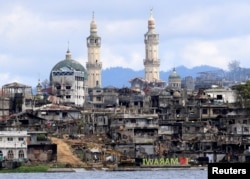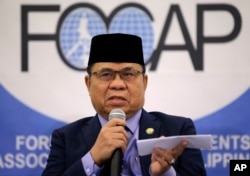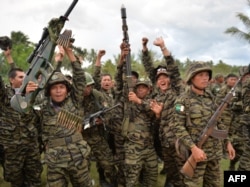A landmark local autonomy law passed this week in the Philippine capital, Manila, gives restive Muslim Filipinos a new sense of hope for resolving a half-century-old conflict over self-rule that has killed 120,000 people and attracted the terrorist group Islamic State.
The Bangsamoro Organic Law received full congressional approval and the president’s signature in the Philippines this week. It follows up a peace deal signed with the most established separatist group, the Moro Islamic Liberation Front. The law will give state funding and local control of natural resources to a largely Muslim region on the southern island of Mindanao.
The law has widespread support in Mindanao, though Muslims warn that the region’s numerous ethnic and separatist groups must share power for it to work. Perceptions of unequal local leadership and lack of commitment by Manila have hurt an existing autonomy regime in Mindanao, they say.
“I share the hope they can achieve their aspirations but of course as one country, not as a separate or even independent area within the Philippines,” said Asec Felix Castro, field office manager with a government agency in charge of rebuilding the Mindanao city of Marawi.
Troops in Marawi battled an Islamic State-inspired Muslim separatist group for five months, killing about 1,100 people and demolishing the city. Marawi will fall under the new autonomous region.
“I’d like to think they can achieve their hope with the proper leadership from among themselves,” Castro said.
Control over resources, funding
Muslims have lived in Mindanao’s west and its outlying islands for more than 500 years. Many resent the Christian majority’s control over minerals and fossil fuels from their resource-rich part of the archipelago.
The new law creates an autonomous region within the Philippines called Bangsamoro. Bangsamoro will replace an existing 12,536 square-kilometer tract carved out for Muslim groups in Mindanao 29 years ago. A voter referendum later this year could expand the region’s boundary.
Bangsamoro will automatically get government block grants equal to 5 percent of national tax and customs revenue. Now the region’s leaders must apply for funding. The central government also will kick in 5 billion pesos ($93.6 million) annually for 10 years for the rehabilitation of conflict areas.
All central money for development of natural resources will go to the Bangsamoro government, per the new law. Revenue from coal, gas, oil and uranium will be equally shared with the Philippine government. The new region may be able to raise its own taxes, some people in Marawi believe.
Bangsamoro leaders will not keep a separate military.
Sense of autonomy
A sense of autonomy for Muslims should make Mindanao safer, said Henelito Sevilla, assistant international relations professor at University of the Philippines. Violence occurs so often that foreign governments advise against travel to Mindanao, leaving the island a reputation that has hurt tourism and investment.
“The self-determination that they are longing for in terms of practicing their own religion and cultural rights, as well as the exploitation of their own resources, that would bring growth and development, and of course which follows is security in their Muslim areas,” Sevilla said.
Congress was set to pass the law in 2015 but stopped after the Moro Islamic Liberation Front ambushed troops and killed 44 commandos. Duterte, himself from Mindanao, had pushed Congress to pass the law this year.
“I really plead for peace,” Duterte said Friday via the presidential website. “I do not want war. I cannot fight my own people.”
People in Marawi expressed tentative hope.
“Autonomy for me is that complete internal sovereignty where the people could practice what they want, wherein they are given the freedom to choose,” said Hamsiya Alilaya, a faculty member with the King Faisal Center for Islamic, Arabic and Asian Studies at Mindanao State University in Marawi.
Sticking points
Power sharing among factions in Bangsamoro will help determine whether it works out, analysts in the country say.
The Moro Islamic Liberation Front has accepted the law and vowed to disarm 30,000 people, according to Philippine news reports. The front must share power to avoid inciting new insurgencies, Philippine scholars believe. Twenty rebel groups, including a violent one that split from the liberation front, operate today in Mindanao.
Government officials must show sincerity in enforcing the Bangsamoro law as well, said Habib Macaayong, president of the Mindanao State University system.
Another major rebel group, the Moro National Liberation Front, wants the law to give job placements and scholarships for people in Bangsamoro, a group representative said last month.
The law should inspire the Moro front to shun any further violence but may form just the first of numerous measures needed to lock in peace, said Enrico Cau, Ph.D. student in international affairs and strategic studies at Tamkang University in Taiwan.







